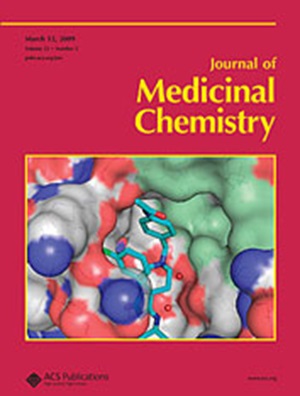IF 6.8
1区 医学
Q1 CHEMISTRY, MEDICINAL
引用次数: 0
摘要
醛酮还原酶1C3(AKR1C3)在肿瘤进展和化疗耐药中起着关键作用,尤其是在索拉非尼耐药的肝细胞癌(HCC)中。靶向 AKR1C3 是恢复耐药 HCC 化疗敏感性的一种有前景的策略。之前的研究通过级联虚拟筛选方法确定了先导化合物 S07-2005(AKR1C3 IC50 = 130 ± 30 nM,SI(选择性指数)> 77)。利用共晶体引导的药物设计,S07-2005 被优化为 "L "形构象,靶向 AKR1C3 的子口袋 1(SP1)和氧阴离子位点(OS),从而提高了抑制效力和选择性(AKR1C3 IC50 = 5 ± 1 nM,SI >2000)。它能增强索拉非尼诱导的 ROS 生成,促进细胞凋亡,并恢复 HCC 模型对索拉非尼的敏感性。化合物 30 与索拉非尼联用,可在体外和体内恢复索拉非尼对 HCC 的敏感性。此外,化合物 30 还表现出良好的安全性和药代动力学特性,这表明它有可能成为克服 AKR1C3 介导的癌症治疗中化疗耐药性的辅助药物。本文章由计算机程序翻译,如有差异,请以英文原文为准。

Discovery of Highly Potent AKR1C3 Inhibitors Treating Sorafenib-Resistant Hepatocellular Carcinoma
Aldo-keto reductase 1C3 (AKR1C3) plays a key role in tumor progression and chemotherapy resistance, particularly in sorafenib-resistant hepatocellular carcinoma (HCC). Targeting AKR1C3 represents a promising strategy to restore chemosensitivity in resistant HCC. Previous research identified the lead compound S07–2005 through a cascade virtual screening approach (AKR1C3 IC50 = 130 ± 30 nM, SI (selective index) > 77). Using cocrystal-guided drug design, 30 was optimized to adopt an “L”-shaped conformation targeting AKR1C3′s subpocket 1 (SP1) and oxyanion site (OS), enhancing inhibitory potency and selectivity (AKR1C3 IC50 = 5 ± 1 nM, SI > 2000). It enhanced sorafenib-induced ROS generation, promoted apoptosis, and restored sorafenib sensitivity in HCC models. In combination with sorafenib, compound 30 restored sorafenib sensitivity in HCC both in vitro and in vivo. Additionally, compound 30 demonstrated a favorable safety profile and pharmacokinetic properties, suggesting its potential as an adjunct to overcome AKR1C3-mediated chemotherapy resistance in cancer treatment.
求助全文
通过发布文献求助,成功后即可免费获取论文全文。
去求助
来源期刊

Journal of Medicinal Chemistry
医学-医药化学
CiteScore
4.00
自引率
11.00%
发文量
804
审稿时长
1.9 months
期刊介绍:
The Journal of Medicinal Chemistry is a prestigious biweekly peer-reviewed publication that focuses on the multifaceted field of medicinal chemistry. Since its inception in 1959 as the Journal of Medicinal and Pharmaceutical Chemistry, it has evolved to become a cornerstone in the dissemination of research findings related to the design, synthesis, and development of therapeutic agents.
The Journal of Medicinal Chemistry is recognized for its significant impact in the scientific community, as evidenced by its 2022 impact factor of 7.3. This metric reflects the journal's influence and the importance of its content in shaping the future of drug discovery and development. The journal serves as a vital resource for chemists, pharmacologists, and other researchers interested in the molecular mechanisms of drug action and the optimization of therapeutic compounds.
 求助内容:
求助内容: 应助结果提醒方式:
应助结果提醒方式:


